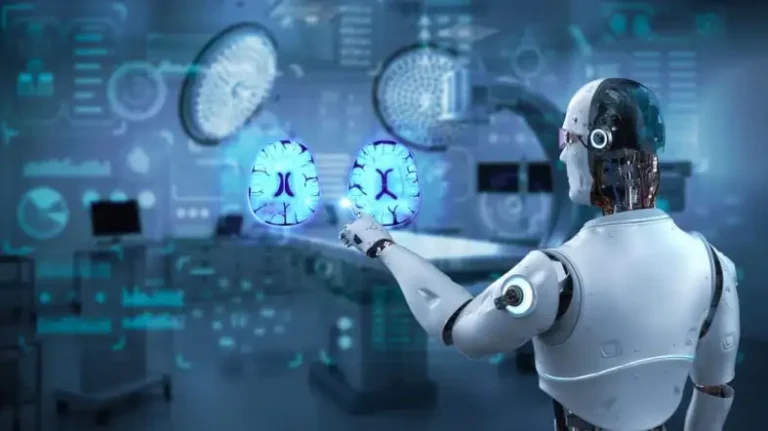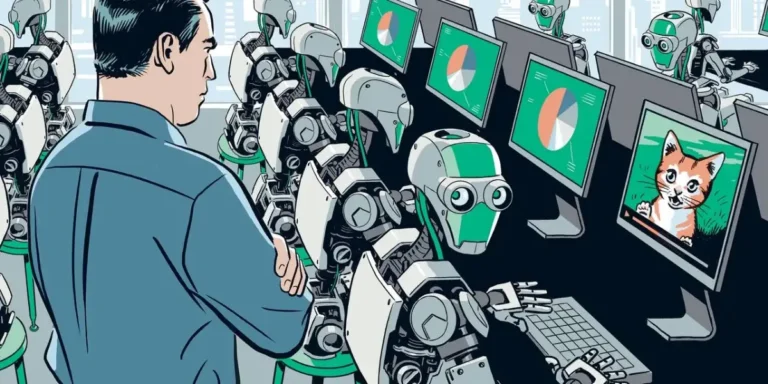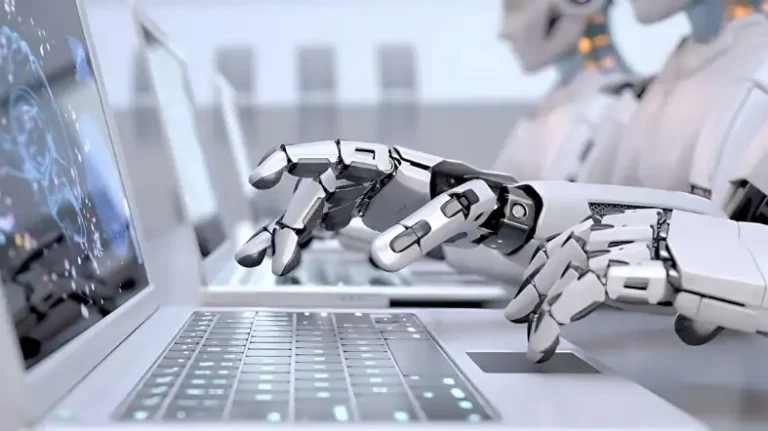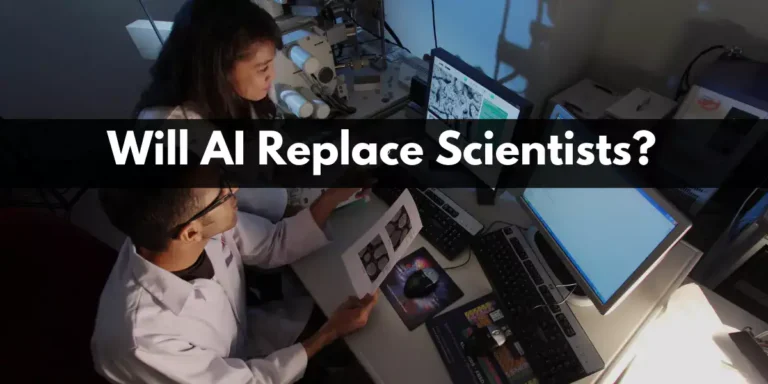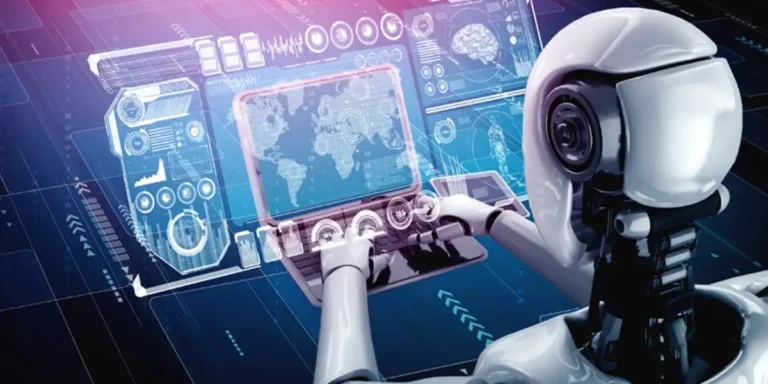AI-powered technologies have been gaining traction in healthcare, with many believing they could replace doctors soon.
However, the prospect of machines replacing human doctors raises many questions and concerns.
In this blog post, we’ll explore AI’s potential in healthcare, its challenges, and whether it will ultimately replace doctors.
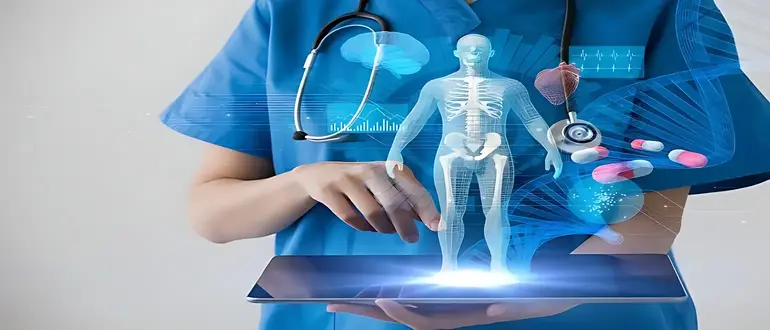
Will AI Replace Doctors?
No, AI is unlikely to replace doctors. While it can provide support and improve patient outcomes, doctors possess knowledge and skills that machines cannot replicate.
Patient care requires a human touch that AI cannot provide. Doctors will remain an integral part of the medical profession, with AI as a tool to complement and enhance their expertise.
How Has AI Been Used In Doctors’ Healthcare So Far?
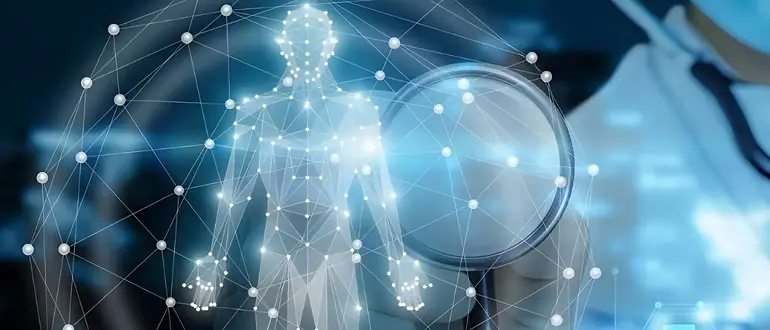
Medical Imaging:
AI has been used in medical imaging to improve accuracy and efficiency in diagnosing and treating diseases.
AI algorithms can detect cancer, heart illness, and Alzheimer’s disease through X-rays, CT scans, and MRIs.
Electronic Health Records (EHR):
AI has been used to analyze and mine large amounts of health data from EHRs, which can help identify patterns and correlations that can lead to better diagnoses and treatments.
EHRs contain vast patient data, such as medical history, diagnoses, medications, and test results.
AI algorithms can analyze this data to identify risk factors, predict patient outcomes, and identify potential health issues before they become more serious.
Drug Discovery:
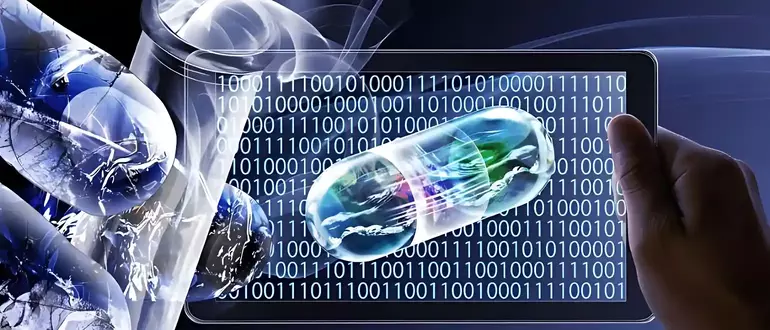
AI can help researchers in drug discovery by analyzing large amounts of data to identify potential drug targets and predict drug efficacy.
AI can also help with clinical trials by identifying patients most likely to respond to a particular treatment.
For example, AI algorithms can analyze patient data to identify common genetic traits among patients who respond well to a certain medication.
This can help researchers develop more targeted and effective drugs.
Virtual Nursing Assistants:
AI-powered virtual nursing assistants can provide patient support, answer questions, and monitor patients remotely.
This can improve patient outcomes and reduce healthcare costs.
Virtual nursing assistants can also help with patient education, reminding patients to take medications or attend appointments, and providing information about healthy behaviors.
Medical Chatbots:
AI-powered medical chatbots can help patients with medical advice and triage. This can improve access to healthcare and reduce the burden on healthcare providers.
Medical chatbots can use natural language processing to understand patients’ questions and provide accurate and personalized responses.
Chatbots can also provide 24/7 support to patients, improving patient outcomes and reducing the need for emergency care.
The Future Impact Of AI On Doctors And Healthcare
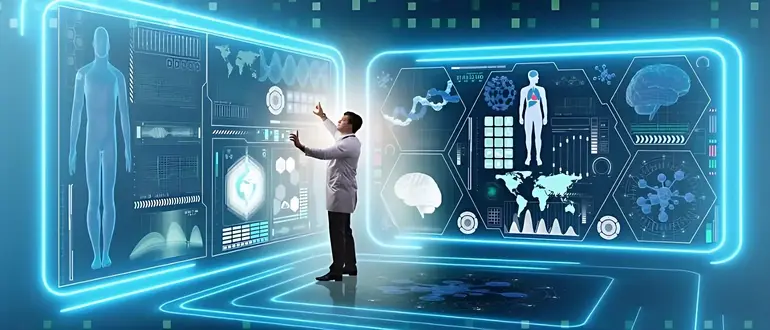
AI-Powered Diagnosis
One of the most significant ways AI impacts the healthcare industry is by diagnosing various diseases.
Doctors can now diagnose ailments faster and more accurately with AI.
AI can process vast amounts of data quickly, making it possible to detect diseases that humans may miss.
This can lead to early detection and treatment, ultimately saving lives.
AI-Assisted Treatment
Apart from aiding in diagnosing diseases, AI is also helping doctors develop personalized treatment plans for patients.
AI can analyze massive patient data using machine learning algorithms to find the best treatment choices. This can improve therapeutic efficacy, recovery, and patient outcomes.
Improved Patient Monitoring
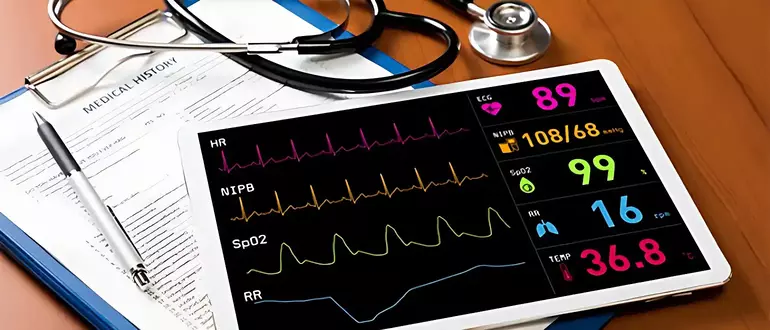
Doctors can watch patients better than ever with AI-powered devices.
Wearable devices that track vital signs and transmit real-time data to doctors can provide valuable insights into a patient’s health.
This can help doctors identify potential health problems before they become serious, leading to faster interventions and better outcomes.
AI-Powered Medical Research
AI also transforms medical studies by helping scientists process massive amounts of data and find hidden patterns.
This can help identify new disease treatments, develop personalized medicine, and improve patient outcomes.
Challenges and Concerns
Despite its many perks, AI in healthcare raises concerns. As healthcare AI grows, job losses are a major worry.
AI’s ethics, especially data privacy, and bias, are another concern. To use AI ethically, these issues must be addressed.
Which sectors of Doctors In Healthcare will Affect By AI?
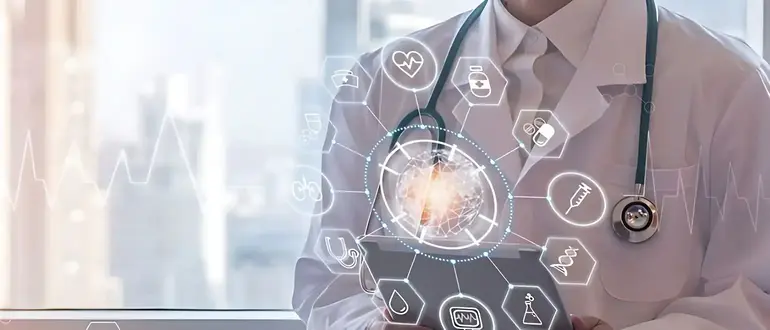
Radiologists:
Radiologists specialize in determining what X-rays, MRIs, and CT scans show about the body.
AI can help radiologists analyze medical images faster and more accurately, reducing the risk of misdiagnosis.
AI can also assist radiologists in detecting abnormalities that may not be visible to the human eye.
This means that radiologists will have to work alongside AI systems to provide better and faster diagnoses.
Pathologists:
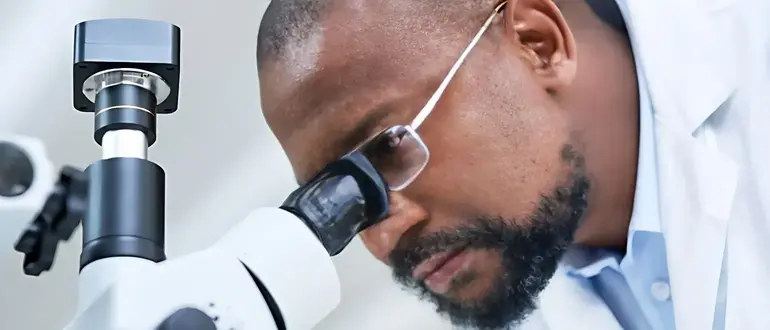
Pathologists are medical doctors who specialize in the diagnosis of diseases by examining tissues and body fluids.
AI can help pathologists by looking at a lot of data and finding trends that humans might not be able to see.
AI can also help doctors find early signs of cancer and other diseases. However, this does not mean that pathologists will become obsolete.
AI will aid pathologists in diagnosing, but the final diagnosis will still require human interpretation.
Oncology:
AI can help doctors personalize cancer treatment based on a patient’s genetic profile.
It can analyze a lot of data to determine the best treatment for a patient based on their genetics. AI can also help with the discovery of new treatments and drugs.
Primary Care Physicians:

Primary care physicians are healthcare professionals who provide first-contact care for patients with undiagnosed symptoms or health concerns.
AI can assist primary care physicians by providing decision-support tools for diagnosis and treatment planning.
AI can also assist in the identification of high-risk patients and in the prevention of chronic diseases.
However, primary care physicians will still need to provide personalized care and make final decisions regarding patient treatment.
Surgeons:
Surgeons are medical doctors who specialize in performing surgeries. AI can assist surgeons by providing real-time data during surgery, improving surgical precision, and reducing the risk of complications.
AI can also assist in preoperative planning, allowing surgeons to visualize the surgical site and plan the surgery more effectively.
However, the final decision during surgery will still be made by the surgeon, and AI will only assist in the process.
Will Doctors’ Innovation Be Affected By AI?
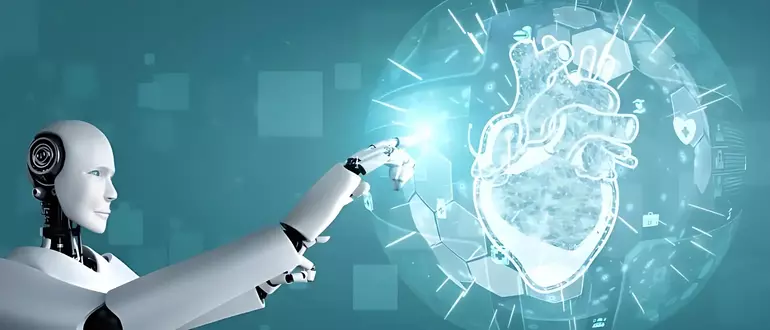
The Potential Impact of AI on Doctor Innovation
AI can support doctors by providing access to vast amounts of medical data, helping to diagnose diseases accurately and quickly, and facilitating treatment plans.
AI can analyze patient data to identify patterns, predict outcomes, and suggest the best action.
This can help doctors diagnose diseases faster and more accurately than ever before.
AI can also automate administrative tasks, allowing doctors to focus more on patient care.
Some argue that AI may limit doctors’ innovation by relying too heavily on data analysis and algorithms.
Critics say AI may detract from doctors’ intuition, creativity, and ability to think outside the box. While AI can offer insights and recommendations, it cannot replace the human touch, empathy, and critical thinking essential for successful patient care.
AI can also assist doctors with surgery by providing real-time feedback and guidance during operations.
This can lead to better outcomes and fewer complications. However, some experts worry that AI will lead to a loss of creativity and innovation among doctors.
The Role of Doctors in AI Development
Despite the potential impact of AI on doctors’ innovation, doctors are playing a key role in AI development.
Many doctors are working with AI researchers and developers to create new tools and applications to improve patient care.
These collaborations are leading to discoveries and innovations in healthcare.
Doctors are also providing valuable feedback on AI tools and applications. They are helping to identify areas where AI can be most useful and where it may fall short.
This feedback is essential for improving AI algorithms and ensuring they are safe and effective for patient use.
What should doctors do to prepare for the integration of AI in healthcare?

Stay informed about AI developments in healthcare.
Stay current on AI developments in healthcare to plan for its integration. Attend conferences and seminars that focus on AI in healthcare, read industry publications, and engage with AI experts in the field.
This will help you comprehend how AI is changing healthcare and how to apply it.
Learn about the benefits of AI in healthcare.
AI has numerous benefits in healthcare, such as improving diagnosis accuracy, enhancing patient outcomes, reducing medical errors, and increasing efficiency.
These benefits will show you how AI can enhance your practice.
Additionally, understanding the benefits will make explaining AI to your patients and colleagues easier, increasing the chances of a successful adoption.
Identify areas where AI can be useful in your practice.
Doctors must assess their current practices and identify areas where AI can be utilized to enhance patient care.
This could include using AI to analyze patient data to identify patterns and predict disease progression.
Or they can utilize AI-powered chatbots for patient communication and support.
Doctors can better understand how AI can benefit their practice by identifying these areas.
Start small and prioritize
When integrating AI into your practice, it’s best to start small and prioritize. Identify the most pressing need in your practice, and begin with a small AI solution that addresses that need.
You can assess the solution’s efficacy and build it up accordingly. Starting small will also reduce the disruption to your current practice and ensure you don’t overwhelm yourself or your staff.
Establish data governance and security protocols.
As AI relies heavily on data, doctors must establish proper data governance and security protocols.
This involves creating data storage, access, and sharing policies and protecting patient data from breaches and cyberattacks.
Train your staff on AI technologies.
Doctors must ensure their staff is properly trained on AI technologies to integrate AI into their practice effectively.
This includes providing training on how to use AI tools, interpreting AI-generated data, and understanding the limitations and potential risks associated with AI.
By providing staff training, doctors can ensure their practice is fully prepared for the integration of AI.
What Are The Pros And Cons Of AI Replacing Doctors?
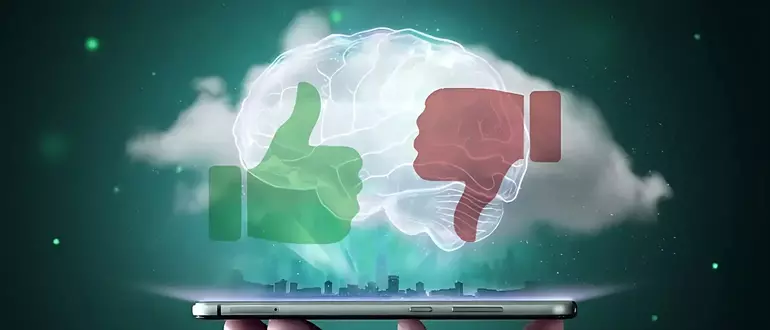
Pros of AI Replacing Doctors
Increased Efficiency
One of the significant advantages of AI replacing doctors is increased efficiency. AI can perform tasks much faster than humans, thus increasing the speed of diagnosis and treatment.
This means that more patients can be seen in less time. AI can analyze vast amounts of data in a short time, enabling it to diagnose illnesses and prescribe treatments more quickly.
Increased Accuracy: AI can process vast amounts of data and provide accurate diagnoses and treatment recommendations with minimal errors. With AI, there is less room for human error.
Consistency
AI can provide consistent care to patients. Machines don’t make mistakes due to fatigue, emotions, or distractions.
Therefore, AI can provide more reliable and accurate diagnoses and treatment plans.
Cost-effective
AI can reduce healthcare costs in the long run. It can perform repetitive tasks and does not require breaks or rest, saving hospitals and patients a lot of money.
Increased Access to Healthcare
AI can help improve access to healthcare, especially in rural areas with a shortage of doctors.
Patients can receive consultations and treatment through telemedicine and virtual visits, which can be more convenient for both doctors and patients.
It can also reduce wait times for medical care.
Cons of AI Replacing Doctors
Lack of Personal Touch
AI lacks the personal touch that human doctors provide. Patients may not feel as comfortable discussing sensitive health issues with a machine, which can lead to misdiagnosis or inadequate treatment.
Lack of Empathy:
AI lacks human emotions and cannot provide the empathy that human doctors can. Patients may prefer human doctors over AI due to the emotional connection they can establish with their doctors.
Limited Ability to Reason
AI is limited in its ability to reason and make decisions outside of programmed algorithms. It may be unable to consider all variables and factors a human doctor would consider.
Potential for Bias
AI can only make decisions based on the data it is programmed with. Therefore, there is a potential for bias in the data, which can lead to bias in diagnoses and treatment plans.
Limited Scope:
AI can only process data and information fed into it. It cannot replace human doctors in complex cases that require experience, judgment, and intuition.
Job Losses
The implementation of AI in healthcare may lead to job losses in the healthcare industry. This could lead to economic and social consequences for healthcare workers and their families.
FAQs
Can AI Outperform Doctors In Certain Medical Tasks?
Yes, studies have shown that AI can outperform doctors in cancer screenings and disease diagnoses, but that doesn’t mean AI can replace doctors entirely.
Will AI Replace Doctors In The Future?
No, there is a strong consensus among experts that AI will not replace doctors entirely.
Rather, AI will enhance what doctors can do by taking on certain tasks.
What Is The Role Of Empathy In Healthcare, And Can AI Replace It?
Empathy is essential to healthcare, and AI cannot replace it.
AI cannot understand emotions, make human connections, and provide emotional support to patients.
Therefore, a human touch is necessary for healthcare.
Will AI Lead To Job Loss For Doctors?
AI will change the nature of some medical jobs, but it will not entirely lead to job loss for doctors.
AI will create new job opportunities and increase the demand for specialists in areas such as data analysis, AI development, and patient care.
Can AI-Complete All Tasks That Doctors Perform?
No, there will always be tasks that algorithms and robots cannot complete, such as providing emotional support, making complex decisions, and interacting with patients personally.
Conclusion
Based on current AI technology and healthcare uses, AI won’t replace doctors anytime soon.
AI can help medics, but it lacks empathy and decision-making skills. Instead, AI should be used to aid doctors in improving patient care.
AI and humans should collaborate.
